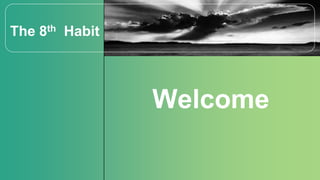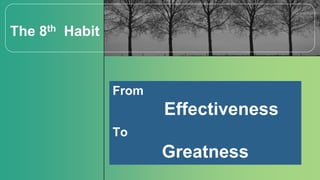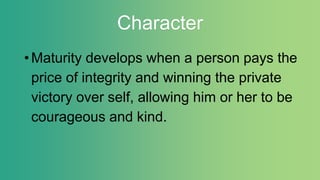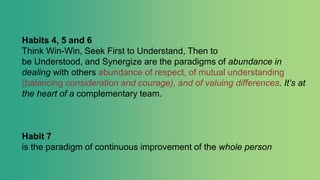character and competence
- 4. Chapter 8 THE VOICE OF TRUSTWORTHINESS— MODELING CHARACTER AND COMPETENCE
- 5. “The supreme quality for leadership is unquestionably integrity. Without it, no real success is possible no matter whether it is on a section gang, a football field, in an Army, or in an office.” 5 DWIGHT DAVID EISENHOWER
- 6. 6
- 7. Stephen R Covey’s findings about Bank Employees Morale ▰ Young president of bank was unable to tackle the problem. He said: “I don’t know what’s wrong?” ▰ The productivity and profit was down. Atmosphere seemed poisoned with suspicion and lack of trust. He ran workshop for two months but nothing helped. ▰ Actually the Employer was the real damage to the Bank not the employees. He was married and he had an affair with one of an employee. ▰ Everyone knew it but not his wife. He has violated a sacred trust with his wife. ▰ In a word, his failing was one of character. 7
- 8. Key Point: 90%of all leadership failures are character failures. 8
- 9. What is trust? ▰ It is the key to all relationships ▰ A glue of organizations. ▰ It is the cement that holds the bricks together. ▰ It is the fruit of the trustworthiness of both people and organizations 9
- 10. Sources of Trust 10 3 2 1 The Institutional The Personal One person consciously choosing to give it to another
- 11. Essential Qualities of a Leader 11 Its surveyed of over 54,000 people and asked them to identify the essential qualities of a leader; integrity was, by far, the number one response.
- 12. “ Character, in the long run, is the decisive factor in the life of an individual and of nations alike. THEODORE ROOSEVELT
- 13. Personal Trustworthiness •Trust comes from trustworthiness •Trustworthiness comes from character and competence
- 14. Trustworthiness
- 16. Character •Integrity means you are integrated around principles and natural laws that ultimately govern the consequences of our behavior •Honesty is the principle of telling the truth. Integrity is keeping promises made to self or others.
- 17. Character •Maturity develops when a person pays the price of integrity and winning the private victory over self, allowing him or her to be courageous and kind.
- 18. Character •Abundance Mentality •It means to see life not as a competition with only one winner but as an abundance of opportunity, resources and wealth. You don’t compare yourself to others and genuinely happy for their successes.
- 19. Competence •The quality or state of having sufficient knowledge, judgment, skill, or strength •Technical Competence is the skill and knowledge necessary to accomplish a particular task •Conceptual competence is being able to see the big picture, how all parts relate to one another
- 20. Competence •Interdependency •Awareness of the reality that all of life is connected, particularly with organizations. •We depend on each other.
- 22. Quotation •One man cannot do right in one department of life whilst he is occupied in doing wrong in any other department. Life is one indivisible whole. Mahatma Gandhi
- 23. MODELING IS LIVING THE 7 HABITS OF HIGHLY EFFECTIVE PEOPLE
- 24. MODELING IS LIVING THE 7 HABITS OF HIGHLY EFFECTIVE PEOPLE The 7 Habits of Highly Effective People embody the essence of becoming a balanced, integrated, powerful person and creating a complementary team based on mutual respect. They are the principles of personal character
- 25. The 7 Habits of Highly Effective People Habit 1—Be Proactive ⮚Being proactive is more than taking initiative. ⮚It is recognizing that we are responsible for our own choices. ⮚Have the freedom to choose based on principles and values rather than on moods or conditions. ⮚Proactive people are agents of change and choose not to be victims, to be reactive, or to blame others.
- 26. Habit 2—Begin with the End in Mind ⮚Individuals, families, teams and organizations shape their own future by first creating a mental vision for any project, large or small, personal or interpersonal. They identify and commit themselves to the principles, relationships and purposes that matter most to them. Habit 3—Put First Things First ⮚Putting first things first means organizing and executing around your most important priorities. ⮚Whatever the circumstance, it is living and being driven by the principles you value most, not by the urgent agendas and forces surrounding you.
- 27. Habit 4—Think Win-Win ⮚Thinking win-win is a frame of mind and heart that seeks mutual benefit ⮚and mutual respect in all interactions. ⮚It’s not thinking selfishly (win-lose) or like a martyr (lose-win). ⮚It’s thinking in terms of “we,” not “me.” Habit 5—Seek First to Understand, Then to be Understood ⮚Intent listening rather than with the intent to reply. ⮚Seeking to understand takes consideration; seeking to be understood takes courage. ⮚Effectiveness lies in balancing or blending the two.
- 28. Habit 6—Synergize Synergy is the third alternative. Synergy is also the key to any effective team or relationship. A synergistic team is a complementary team where the team is organized so that the strengths of some compensate for the weaknesses of others. Habit 7—Sharpen the Saw Sharpening the saw is about constantly renewing ourselves in the four basic areas of life: physical, social/emotional, mental and spiritual. It’s the habit that increases our capacity to live all other habits of
- 29. TABLE
- 30. PRINCIPLES EMBODIED IN THE 7 HABITS ⮚First, they are universal. ⮚Second, they are timeless. Third, they are self-evident. The 7 Habits are character principles that shape who and what you are. They provide the credibility, moral authority and skill base for your influence in an organization, family, community and society.
- 31. 4 Roles of Leadership The 4 Roles of Leadership are then what you do as a leader to inspire others to find their voice. 7 habits are at the core of the first of the 4 Roles of Leadership modeling.
- 32. 7 HABITS PARADIGMS Habit 1, Be Proactive, is a paradigm of self-determination Habit 2, Begin with the End in Mind, It’s the power of focus. Habit 3 is the paradigm of priority, action and execution
- 33. Habits 4, 5 and 6 Think Win-Win, Seek First to Understand, Then to be Understood, and Synergize are the paradigms of abundance in dealing with others abundance of respect, of mutual understanding (balancing consideration and courage), and of valuing differences. It’s at the heart of a complementary team. Habit 7 is the paradigm of continuous improvement of the whole person
- 34. THE MODELING TOOL,THE PERSONAL PLANNING SYSTEM ⮚Your first job is to get your act together to create FOCUS in your life. ⮚ You simply have to decide what matters most to you. ⮚The focusing tool of the first role is a personal planning system. ⮚You begin by writing down, either in your paper planner or your electronic planning device, what matters most to you.
- 36. FILM: Big Rocks ⮚Always think in terms of big rocks first. ⮚Determine what is most important in your life and make your decisions ⮚based on those very important criteria. ⮚ The main thing is to keep the main thing the main thing. ⮚With a burning “yes” around your high priorities, you can easily say “no” to things that are urgent but not important smilingly, cheerfully, guilt-free, “No!”




































